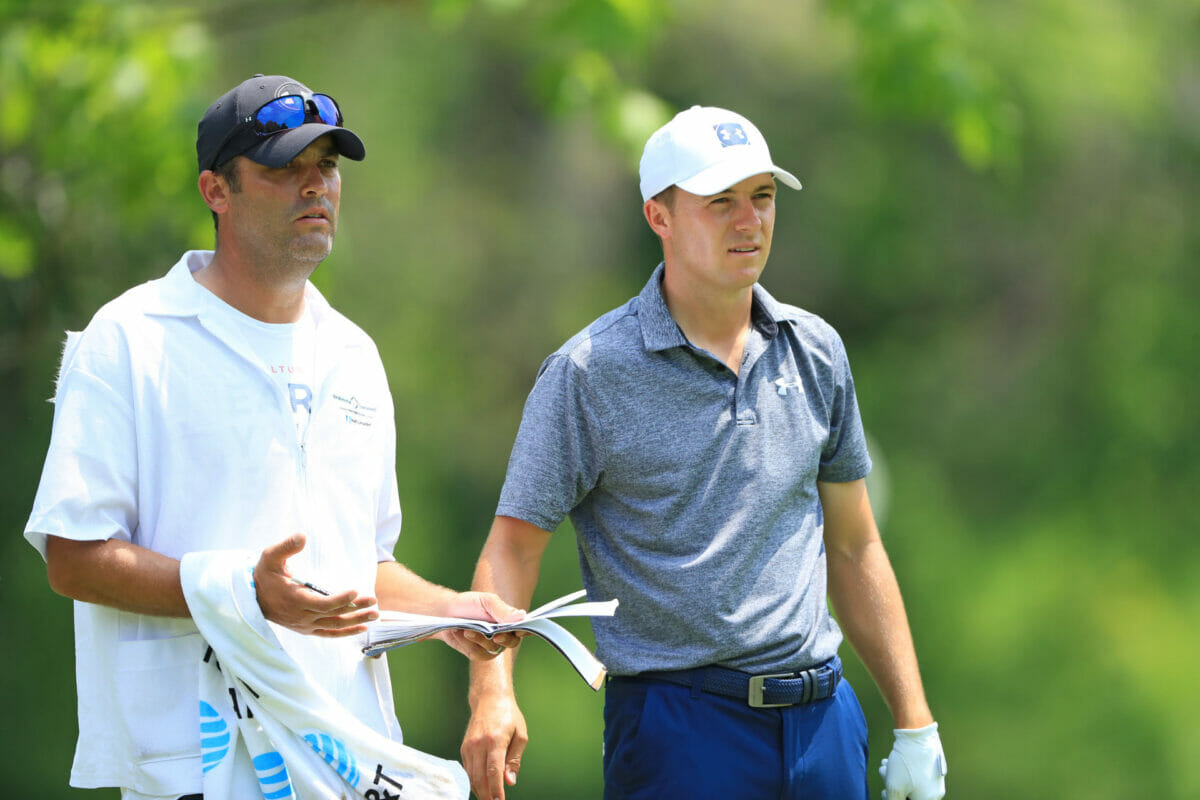Who knew caddies were so important? 2019 and despite a litany of technological advancements that not even ‘Back to the Future’ creator, Robert Zemeckis could envisage in 1985, the Sherpas of the fairways are relied upon now more than ever. Setting out on reconnaissance missions days before their charge arrives to the course to ensure not a step is wasted come game day, a caddie gets to grips with prevailing winds, green speeds, spots to miss and turf to kiss; recording each nugget of intricate detail in an invaluable notebook of work for their boss to scrutinise with a fine comb later. Who’d want to be a caddie, you ask?
Take one of the bagmen to enter the spotlight after the US Open; Michael Greller, Jordan Spieth’s caddie. Golf fans around the world were left outraged after an exchange between the pair was picked up by a nosey microphone.
“Two perfect shots, Michael,” Spieth bemoaned after his four-iron tee shot on the par-4 eighth ran out of fairway and found the Pacific Ocean before his third shot approach airmailed the green. “You got me in the water on one and over the green on the other.”
With the internet in uproar, the messages flooded in asking Spieth, who presumably enjoys reading the comments under his videos as much as I do my articles, if it was Greller with club in hand when the shots went astray? In the armchair pundits’ defence, ultimately, the final call will always fall on the player, but there’s no doubt Greller’s culpable here too.
When it comes to Spieth’s numbers, every shot has an exact end point. Be it the stock swing, the three-quarter wedge, the stinger, it’s Greller who gives the yardage and the formula for finding the right distance. Sure, there are sometimes variables at play with switching winds and flier lies, but in this equation, Greller is Rain Man, and Rain Man needs to be right.
“When you hit a couple of shots exactly where you want to, and one’s in the water and the other’s dead over the green, I’m gonna be frustrated that, as a team, we didn’t figure out how to make sure that didn’t happen,” Spieth explained afterwards.
“I may have looked like the bad guy but my intentions there were that we should have been in play if the ball is hit solidly and I was out of play on both shots.”
When the pressure cranks in golf; it does so upon one man’s head – the player, and unfortunately for the caddie, he/she will always be the fall guy, the stress ball for times of trouble, even when the blame lies elsewhere. So, why be a caddie?
Well, Michael Greller was a Maths teacher in 2011 earning $55,000 a year in Seattle. Caddying as a hobby on the side, Greller got a call to carry the bag of an up–and–coming talent named Jordan Spieth in the US Junior Amateur. Sure enough, Spieth won. Eight years later and Greller has guided Spieth to over $40million in prize money, of which he’s taken home at least 10%. Get the right bag and who wouldn’t want to be a caddie? Steve Williams was the richest sportsman in New Zealand when he worked for Tiger Woods; he took home nearly $10million in a dozen years. And he deserved it too.
No matter how far the technology within the game develops, a computer will never be able to do the job of a caddie. It’s personal and as much as it’s about providing yardages and course knowledge, it’s more about offering emotional comfort and support to a high-strung golfer often in need.
That said, it’s an intense relationship that regularly comes with an expiry date; think McIlroy and JP Fitzgerald or Lowry and Dermot Byrne, but that’s just part and parcel of the environment. McIlroy’s moved on with best man Harry Diamond and the results of a fresh dynamic have been irrefutable with wins arriving at The Players and in Canada, while Lowry’s rise up the world rankings shows no signs of stopping with new bag man, Bo Martin at the helm.
Still, in the caddie game, although cut-throat, a good guide will always find work – just look at JP. The man who guided McIlroy to his four Major wins over the best part of a decade, returned to the PGA Tour at June’s Travelers tournament partnering NCAA Champion, Matthew Wolff on his professional debut. The 20-year old is an Oklahoma State graduate with a unique but most athletic swing and a bubbling personality sure to make him an instant hit with the fans. Whether he can prove an instant hit with JP’s pocket remains to be seen but Fitzgerald’s guidance should prove invaluable as one of the most exciting talents in the game turns his hand to the pro ranks. Watch this space!
























Leave a comment